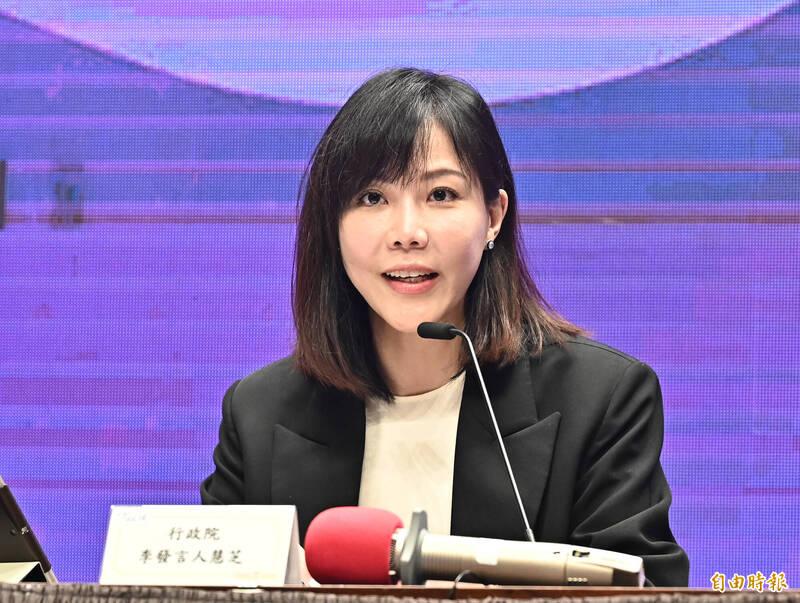The Executive Yuan is to request the legislature to reconsider amendments to the Constitutional Court Procedure Act (憲法訴訟法) after it obtains approval from President William Lai (賴清德), Cabinet spokesperson Michelle Lee (李慧芝) said today.
The amendments passed last month with votes from the opposition Chinese Nationalist Party (KMT) and the smaller Taiwan People’s Party (TPP) after hours of brawls between lawmakers from the opposition and the ruling Democratic Progressive Party (DPP).
The amendments to the Constitutional Court Procedure Act require 10 judges to attend court sessions and nine judges to agree before legislation can be declared unconstitutional.

Photo: Wang Yi-song, Taipei Times
The amendments would allow the legislature to override the judiciary, setting an “unreasonable threshold” that would disrupt the operation of the Constitutional Court, which would not be in line with the Grand Justices’ obligation, Lee cited Premier Cho Jung-tai (卓榮泰) as saying.
This could affect the public's right to seek remedies or to resolve constitutional disputes, endangering the constitutional order, Cho added.
Also, amendments to Article 4 of the act would not help to ensure the stable operation of the Constitutional Court as it does not set a legal time limit for the legislature to approve the nomination of Grand Justices by the president, said Cho.
Amendments to Article 95 of the act would prevent the incumbent Grand Justices from exercising their constitutional duties, paralyzing the Constitutional Court, as there is no transitional provision.
The Executive Yuan’s request to reconsider the amendments would delay the law’s coming into effect and would test the unity of the KMT and the TPP as the former does not have a majority by itself in the legislature, DPP Legislator Chung Chia-pin (鍾佳濱) said.
A constitutional interpretation would be sought if the legislature votes down the motion to reconsider the bill, DPP caucus chief executive Rosalia Wu (吳思瑤) said.
Meanwhile, Lee said the Cabinet had not received any official notice of two other sets of amendments to the Public Officials Election and Recall Act (公職人員選舉罷免法) and the Act Governing the Allocation of Government Revenues and Expenditures (財政收支劃分法) that were also approved by KMT and TPP lawmakers last month.
Those amendments would tighten the requirements for petitions used to initiate a recall of an elected official and reallocate more funding from the central government to local governments — regulations that the Cabinet has said it would seek to have rejected.
Lee said if the amendments are to be sent to the Executive Yuan on the last working day before the Lunar New Year, the Executive Yuan would have to decide whether to request the legislature to reconsider the bills in ten days.
This would mean the Executive Yuan would have to make a request by Feb. 2, she said.
If the Executive Yuan is to make a request during the Lunar New Year, the legislature would have to handle it within 15 days, she said, adding that the motion would be considered passed otherwise.
If the lawmakers vote down the motion, the Executive Yuan would discuss further actions, Minister without Portfolio Lin Ming-hsin (林明昕) said.
The president would have ten days to promulgate the law which would not come into effect immediately after the legislature votes down the motion, Lin said.

The Mainland Affairs Council (MAC) today condemned the Chinese Communist Party (CCP) after the Czech officials confirmed that Chinese agents had surveilled Vice President Hsiao Bi-khim (蕭美琴) during her visit to Prague in March last year. Czech Military Intelligence director Petr Bartovsky yesterday said that Chinese operatives had attempted to create the conditions to carry out a demonstrative incident involving Hsiao, going as far as to plan a collision with her car. Hsiao was vice president-elect at the time. The MAC said that it has requested an explanation and demanded a public apology from Beijing. The CCP has repeatedly ignored the desires

Many Chinese spouses required to submit proof of having renounced their Chinese household registration have either completed the process or provided affidavits ahead of the June 30 deadline, the Mainland Affairs Council (MAC) said on Thursday. Of the 12,146 people required to submit the proof, 5,534 had done so as of Wednesday, MAC deputy head and spokesperson Liang Wen-chieh (梁文傑) said. Another 2,572 people who met conditions for exemption or deferral from submitting proof of deregistration — such as those with serious illnesses or injuries — have submitted affidavits instead, he said. “As long as individuals are willing to cooperate with the legal

The Ma-anshan Nuclear Power Plant’s license has expired and it cannot simply be restarted, the Executive Yuan said today, ahead of national debates on the nuclear power referendum. The No. 2 reactor at the Ma-anshan Nuclear Power Plant in Pingtung County was disconnected from the nation’s power grid and completely shut down on May 17, the day its license expired. The government would prioritize people’s safety and conduct necessary evaluations and checks if there is a need to extend the service life of the reactor, Executive Yuan spokeswoman Michelle Lee (李慧芝) told a news conference. Lee said that the referendum would read: “Do

Taiwan's Vice President Hsiao Bi-khim (蕭美琴) said Saturday that she would not be intimidated by the Chinese Communist Party (CCP), following reports that Chinese agents planned to ram her car during a visit to the Czech Republic last year. "I had a great visit to Prague & thank the Czech authorities for their hospitality & ensuring my safety," Hsiao said on social media platform X. "The CCP's unlawful activities will NOT intimidate me from voicing Taiwan's interests in the international community," she wrote. Hsiao visited the Czech Republic on March 18 last year as vice president-elect and met with Czech Senate leadership, including